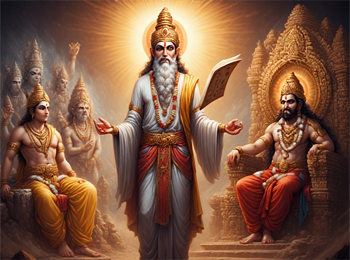 There once lived a great saint, a profound ascetic with deep knowledge of many sacred scriptures. He had memorized countless verses and was revered far and wide for his wisdom and spiritual depth.
There once lived a great saint, a profound ascetic with deep knowledge of many sacred scriptures. He had memorized countless verses and was revered far and wide for his wisdom and spiritual depth.
The saint spent every moment immersed in devotion to God, engaging in intense penance and meditation. However, he had no interest in selfless service. He believed that true spiritual knowledge could only be attained through divine meditation – not by helping others.
He neither took anything from anyone nor gave anything to others. He caused no harm, yet he also did no good. People considered him virtuous, as he posed no threat to society. Because of this, his spiritual reputation continued to grow far and wide.
One day, while meditating under a banyan tree, the saint suddenly passed away.
After death, when he stood before Chitragupta (the divine record keeper), he was told: “O ascetic! Seeing your lifelong devotion and penance, you shall be reborn into a noble and prestigious family.”
Hearing this, the saint became sorrowful and asked, “O Chitragupta! I have spent years in deep penance. I never wavered in my devotion. I never harmed any living being. Then why have I not attained liberation (moksha)?”
Chitragupta brought the saint before Dharma Raja (the Lord of Justice).
Saint humbly recounted his entire life his spiritual practices, meditations and religious observances in great detail.
After listening patiently, Dharma Raja smiled and said, “O child! You never truly understood the essence of human duty. I know your penance was pure, and you caused no harm.
But…
You never showed compassion. You never used your vast knowledge to uplift the ignorant. You never healed the sick, nor did you guide the lost. In truth, you never understood that selfless service is the true foundation of human dharma.
A spirit of service must be at the heart of every spiritual life.”
Realizing his mistake, the saint vowed to dedicate his next life not only to penance but also to compassionate service. It was only after many years of following this balanced path that he finally attained liberation (moksha).
Conclusion:
One who lives only for themselves is a seeker. But one who lives for others – is a True Devotee.
You May Also Like: Disciple to Monk – What is Compassion..?
Search Keywords: When Worship Lacks Compassion – Saint’s Awakening, Selfless Service, Spiritual wisdom, Compassion in spirituality, Role of service in devotion, True Devotee vs Seeker, Path to Liberation, Meditation and Service, Serving Humanity as Worship
